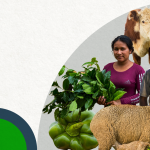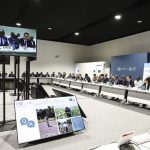PLACA generates concrete proposals on climate action in agriculture for COP30
- News
-
Jul 24
- Compartir publicación
With FAO´s support, the climate action platform concluded its annual assembly with solutions that will serve as inputs for global negotiations on climate change.
July 24, 2025. The Platform of Latin America and the Caribbean for Climate Action on Agriculture (PLACA) concluded its Annual Assembly today in Guatemala City. The two-day meeting brought together representatives of the 18 member countries, marking a milestone in the region's preparations for the COP30 Climate Change Summit to be held in Belém, Brazil, this year.
With the technical support of the Food and Agriculture Organization of the United Nations (FAO), which acts as the Secretariat, PLACA has been consolidating its role as a regional articulator, facilitating collaboration between countries and promoting solutions aligned with the priorities of the Paris Agreement, the Nationally Determined Contributions 3.0, the Global Goal on Adaptation (GGA), and more recently considering the Loss and Damage framework.
"This Assembly demonstrated PLACA's ability to translate local needs into concrete proposals for global negotiations, positioning our agri-food systems as a fundamental part of the climate solution," explained María Mercedes Proaño, FAO Climate Finance Officer.
During the Assembly, an exchange was held on Agroclimatic Technical Tables and anticipatory actions, highlighting their value for decision making in this area. Priorities included the importance of developing common indicators to make visible the sector's contribution to climate commitments and the promotion of strategic alliances that connect PLACA's technical work with financing opportunities and political advocacy in global spaces.
In the area of climate negotiations, the countries discussed the opportunities and challenges facing the region in the various forums of the United Nations Framework Convention on Climate Change, from COP29 to the regional workshop for Latin America on international negotiations on agriculture.
Emphasis was also placed on the perspectives and guidelines for COP30, highlighting the importance of data-based decision making to promote national agricultural policies.
PLACA also noted that more than 2,200 professionals have been trained in topics such as rural extension, technified irrigation, sustainable soil management, negotiations in agriculture, or policies in national or sectoral adaptation or mitigation plans, through its four Thematic Working Groups, coordinated by the ministries of Ecuador, Chile, Mexico and Guatemala, which promote cooperation and exchange among the member countries.
En la Asamblea, también participaron organizaciones como el Programa Mundial de Alimentos en Guatemala, el Banco Mundial y el Centro Internacional de Agricultura Tropical.
New presidency
Guatemala presented the milestones of its work as chair of the platform over the last twelve months, emphasizing a technical document on Agroclimatic Technical Tables, a Policy Note on SDG 6.4, and the incorporation of Belize and Honduras as new member countries.
Peru assumed the leadership of the mechanism for the period 2025-2026 with the commitment to strengthen the political positioning of the Platform at the regional and multilateral levels.
Brazil was elected as the new co-presidency of PLACA and will accompany Peru in the 2025-2026 period.
"FAO's office for Latin America and the Caribbean is assisting multiple initiatives that seek to position sustainable food systems as a key solution to climate change. This is a fundamental discussion ahead of the COP on Climate Change to be held in Brazil this year," said María Mercedes Proaño.
PLACA competition
With the aim of promoting sustainable practices in the face of climate change, PLACA today launched the call for entries for the fourth edition of its regional competition for practical and low-cost technological solutions for climate action, focusing on resilient livestock farming, responsible fishing and sustainable aquaculture.
Applications will be accepted from July 24 to September 28.
Noticias relacionadas
Cart
- Telegram
- Tumblr
- VKontakte
- Copy link
Suscríbete al Boletín de Noticias
Suscríbete al Boletín de Noticias Semestral de PLACA y recibe información sobre:
Sin spam · Cancela cuando quieras



